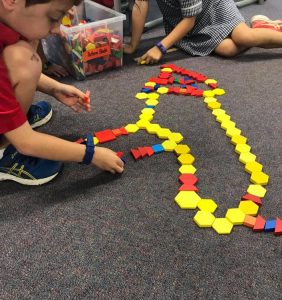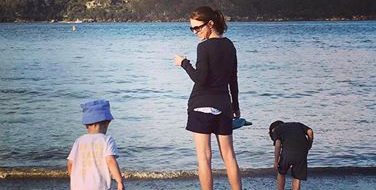 Among the many traits The Kid and I have in common is a reticence for eye contact, though each of us has our own reasons. Mine: a condition called congenital nystagmus that renders my eyeballs shaking marbles in my head and often leads people to ask me “why [I’m] doing that weird thing with [my] eyes.” His: a propensity to be overwhelmed by sensory input, including but not limited to others’ gazes.
Among the many traits The Kid and I have in common is a reticence for eye contact, though each of us has our own reasons. Mine: a condition called congenital nystagmus that renders my eyeballs shaking marbles in my head and often leads people to ask me “why [I’m] doing that weird thing with [my] eyes.” His: a propensity to be overwhelmed by sensory input, including but not limited to others’ gazes.
Actually, maybe we have that reason in common as well.
All my life I’ve resisted the socially-required act of holding eye contact. I’ve looked everywhere but at the person to whom I’m speaking during a conversation, often leading that person to turn and check behind them to see what I’m looking at. Sometimes I forget that my eyes do this freaky thing and then, when someone looks at me a bit closely, I remember and start swimming in self-consciousness.
“Eye contact” is an actual goal in TK’s therapy program, a heavily-emphasised action that he is constantly encouraged about. “Oops, where are your lovely eyes?” he’ll be asked. “Where am I, James?” I imagine him rolling those lovely eyes when no one is looking, muttering “You don’t know my life” under his breath.
I know we each also have non-diagnosed reasons for shying away from being stared down: as introverts, we can get worn down by contact with others; we like to protect ourselves and our space. So much so that having someone look at us can feel like our souls are being peered into without our permission.
Have I mentioned that we’re both sensitive?
I’m writing this on a Tuesday, and this afternoon I’ll be going to TK’s class to continue what is becoming a tradition since last year’s inaugural event: my speaking to his class about autism, or his “apple brain,” as is our preferred nomenclature for the way his mind and body work. I’ll show photos and a video and tell his story and answer questions. It’s something I’m privileged to do, and nervous about. I’m opening a window on both of us, inviting people to peer inside. It’s unnerving, and wonderful. Hard, and easy. But my mind was made up when my friend told me that her son still talks about the wonder of “James’s apple brain” a year after the last talk.
I never chose to be an advocate. When I was in my residency, I wrote a paper about autism and remember thinking how interesting and foreign it was. The autism I wrote about–the specific behaviours, the dental effects–does not describe my son in the least. Maybe that was why I had such a hard time accepting his diagnosis when it was handed to us four years ago: it didn’t fit into the parameters I had sectioned off when I was studying it as a foreign entity back in school.
Because now, the spectrum is a real and living thing. It limits and it gifts; yet it still doesn’t define. It is a part and not the whole. The whole is The Kid, and this is the story I tell: of all he’s been through, of what he likes and dislikes, excels at and needs help with. Of how he has kindness in spades (and of how I am seriously considering getting a bumper sticker that reads, “My kid on the spectrum is more empathetic than your kid who’s not”). Of how he’s a big brother and can’t stand vegetables. Of how he is you, and me.
I’ve had to lay down so much armour I carried into adulthood, and parenthood, so that people can really see me, and see us. I’ve had to showcase scars because they are such an integral part of our story. And, so far, I’ve typically been met with love and understanding (to my face). Still, it’s uncomfortable. It means I get asked about my eyes, or about the red ink on my and TK’s hands–the love buttons we share to send hugs when we’re apart. It means I get to document how nothing is as I expected it to be, and how this has both broken and blessedly remade me, sending the painfully shy and fearful girl toward microphones, into classrooms, telling the story she didn’t choose but the one that’s being written for her, for hers–the hardest and best kind of story there is.

2 comments on “Look Me in the Eye”
OMG- this is so good. The writing is so true, so immediate, so involving, so evocative, so engrossing and so telling. Thanks Steph for sharing your heart. We all love you and can relate to your words and feelings. X
this is so lovely–your heart shines right through your beautiful writing. I love following your story. Blessing to you and your family.